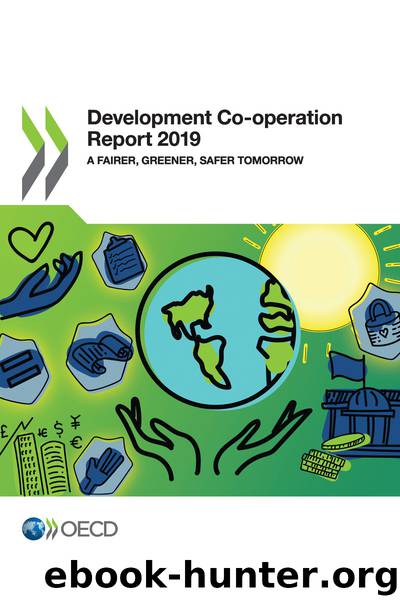Development Co-operation Report 2019 by OECD

Author:OECD
Language: eng
Format: epub
Tags: development
Publisher: OECD Publishing
Published: 2019-12-10T00:00:00+00:00
Challenging times for multilateral co-operation
Trust in governments and institutions is plummeting and populism, protectionism and exclusive nationalism are on the rise
- OECD Secretary-General, Angel Gurría
In the face of these shared challenges, we need more, not less, co-operation and collective action. Just four years after adopting the 2030 Agenda and other international agreements adopted in 2015, there is concern that 2015 may end up representing “the zenith of global multilateralism”.76 In 2019, global multilateralism and the ambitious goals set by the world community are under threat.
The global co-operative spirit, bolstered by an agreed set of international laws and norms, is how we tackle threats to global peace, security and prosperity and set a trajectory for future generations. This spirit is responsible for milestones like the Chemical Weapons Convention, the first multilateral disarmament agreement to provide for the elimination of an entire category of weapons of mass destruction.77 It’s responsible for the EU Solidarity Fund, created in 2002 to help EU member countries recover from disasters. It’s the reason 152 countries endorsed the first Global Compact on Migration, which strengthens states’ sovereignty to manage migration while empowering migrants and host communities.78
The dynamism of new powers from the developing world are demanding a more equitable distribution of voices and responsibilities, which is enhancing and challenging global governance. The emergence of South-South co-operation is part of a rebalancing of political and economic power worldwide.79 Along with these geopolitical changes, international capital markets have grown larger. This has increased the risks of financial instability, tax avoidance, tax evasion and illicit flows, but also diversified the sources of development financing, resulting in easier access to private finance for many developing countries. As a consequence, the relative weight of ODA among international resources for development, especially in many middle-income developing countries, has shrunk significantly.80
The BRICS states of Brazil, Russia, India, China and South Africa are also creating new multilateral institutions, for instance through the establishment of the New Development Bank, which aims to “mobilize resources for infrastructure and sustainable development projects in BRICS and other emerging economies and developing countries”.81 Many of these nations are simultaneously benefiting from and contributing to development co-operation. Their growing roles illustrate that countries can no longer be divided neatly into developed and developing. Emerging economies may still contend with high levels of extreme poverty domestically even as they are global players within international development, whether through their seats in the Group of Twenty or through South-South co-operation.
Each individual nation, from the wealthiest to the most challenged, sits firmly in the driver’s seat on its own development journey. But their development pathways are shaped by a multilateral system that is built on political legitimacy, neutrality and wide membership. As the largest financing partners to the multilateral system, countries providing development co-operation play a major role in keeping the system running to reach the end destination of a peaceful world with protected global public goods.82
Download
This site does not store any files on its server. We only index and link to content provided by other sites. Please contact the content providers to delete copyright contents if any and email us, we'll remove relevant links or contents immediately.
| CPA Test | GMAT Test |
| Statistics |
Cracking the GRE Premium Edition with 6 Practice Tests, 2015 (Graduate School Test Preparation) by Princeton Review(3597)
What It Really Takes to Get Into Ivy League and Other Highly Selective Colleges by Hughes Chuck(3221)
The Marketing Plan Handbook: Develop Big-Picture Marketing Plans for Pennies on the Dollar by Robert W. Bly(2414)
Fooled by Randomness: The Hidden Role of Chance in Life and in the Markets by Nassim Nicholas Taleb(2413)
The Tyranny of Metrics by Jerry Z. Muller(2401)
The Official Guide for GMAT Review 2015 with Online Question Bank and Exclusive Video by Graduate Management Admission Council (GMAC)(2342)
Ultralearning by Scott Young(2319)
50 Economics Classics by Tom Butler-Bowdon(2067)
The Visual MBA by Jason Barron(1633)
The Inevitable by Kevin Kelly(1557)
Data Science for Business by Foster Provost & Tom Fawcett(1513)
Out of the Crisis by Deming W. Edwards(1500)
GMAT Official Guide 2018 Verbal Review by GMAC (Graduate Management Admission Council)(1384)
Cracking the LSAT, 2012 Edition by Princeton Review(1347)
The Conflict Resolution Phrase Book by Barbara Mitchell & Cornelia Gamlem(1342)
Maths and Stats for Web Analytics and Conversion Optimization by Himanshu Sharma(1299)
The Personal MBA: Master the Art of Business by Josh Kaufman(1269)
College Essays that Made a Difference by Princeton Review(1266)
Cracking the SAT Premium Edition with 6 Practice Tests, 2017 by Princeton Review(1254)
